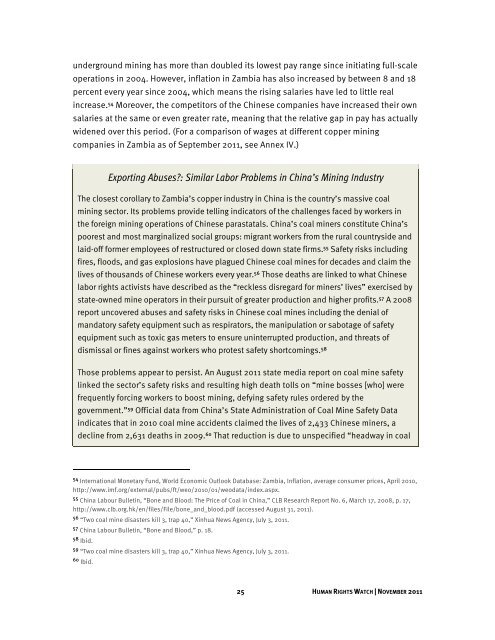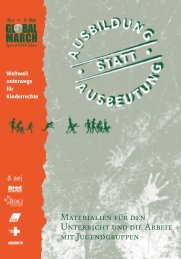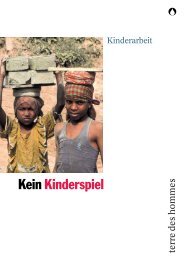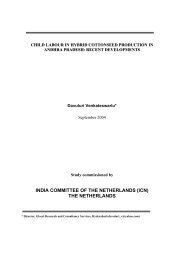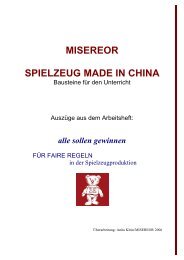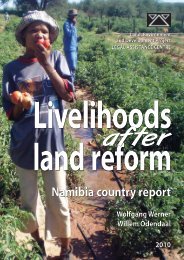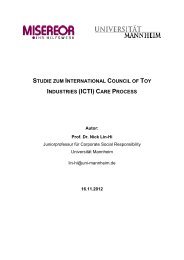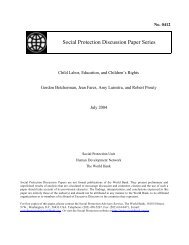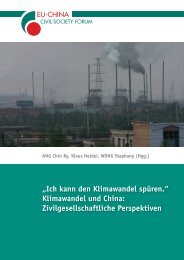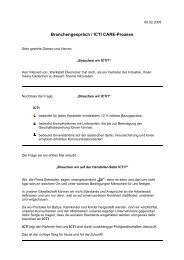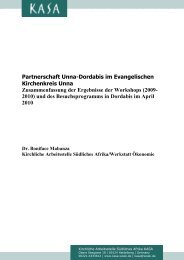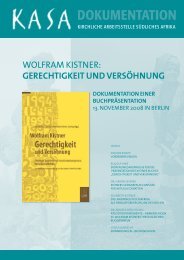“You'll Be Fired if You Refuse†- Human Rights Watch
“You'll Be Fired if You Refuse†- Human Rights Watch
“You'll Be Fired if You Refuse†- Human Rights Watch
Create successful ePaper yourself
Turn your PDF publications into a flip-book with our unique Google optimized e-Paper software.
underground mining has more than doubled its lowest pay range since initiating full-scale<br />
operations in 2004. However, inflation in Zambia has also increased by between 8 and 18<br />
percent every year since 2004, which means the rising salaries have led to little real<br />
increase. 54 Moreover, the competitors of the Chinese companies have increased their own<br />
salaries at the same or even greater rate, meaning that the relative gap in pay has actually<br />
widened over this period. (For a comparison of wages at d<strong>if</strong>ferent copper mining<br />
companies in Zambia as of September 2011, see Annex IV.)<br />
Exporting Abuses?: Similar Labor Problems in China’s Mining Industry<br />
The closest corollary to Zambia’s copper industry in China is the country’s massive coal<br />
mining sector. Its problems provide telling indicators of the challenges faced by workers in<br />
the foreign mining operations of Chinese parastatals. China’s coal miners constitute China’s<br />
poorest and most marginalized social groups: migrant workers from the rural countryside and<br />
laid-off former employees of restructured or closed down state firms. 55 Safety risks including<br />
fires, floods, and gas explosions have plagued Chinese coal mines for decades and claim the<br />
lives of thousands of Chinese workers every year. 56 Those deaths are linked to what Chinese<br />
labor rights activists have described as the “reckless disregard for miners’ lives” exercised by<br />
state-owned mine operators in their pursuit of greater production and higher profits. 57 A 2008<br />
report uncovered abuses and safety risks in Chinese coal mines including the denial of<br />
mandatory safety equipment such as respirators, the manipulation or sabotage of safety<br />
equipment such as toxic gas meters to ensure uninterrupted production, and threats of<br />
dismissal or fines against workers who protest safety shortcomings. 58<br />
Those problems appear to persist. An August 2011 state media report on coal mine safety<br />
linked the sector’s safety risks and resulting high death tolls on “mine bosses [who] were<br />
frequently forcing workers to boost mining, defying safety rules ordered by the<br />
government.” 59 Official data from China’s State Administration of Coal Mine Safety Data<br />
indicates that in 2010 coal mine accidents claimed the lives of 2,433 Chinese miners, a<br />
decline from 2,631 deaths in 2009. 60 That reduction is due to unspec<strong>if</strong>ied “headway in coal<br />
54 International Monetary Fund, World Economic Outlook Database: Zambia, Inflation, average consumer prices, April 2010,<br />
http://www.imf.org/external/pubs/ft/weo/2010/01/weodata/index.aspx.<br />
55 China Labour Bulletin, “Bone and Blood: The Price of Coal in China,” CLB Research Report No. 6, March 17, 2008, p. 17,<br />
http://www.clb.org.hk/en/files/File/bone_and_blood.pdf (accessed August 31, 2011).<br />
56 “Two coal mine disasters kill 3, trap 40,” Xinhua News Agency, July 3, 2011.<br />
57 China Labour Bulletin, “Bone and Blood,” p. 18.<br />
58 Ibid.<br />
59 “Two coal mine disasters kill 3, trap 40,” Xinhua News Agency, July 3, 2011.<br />
60 Ibid.<br />
25 HUMAN RIGHTS WATCH | NOVEMBER 2011


